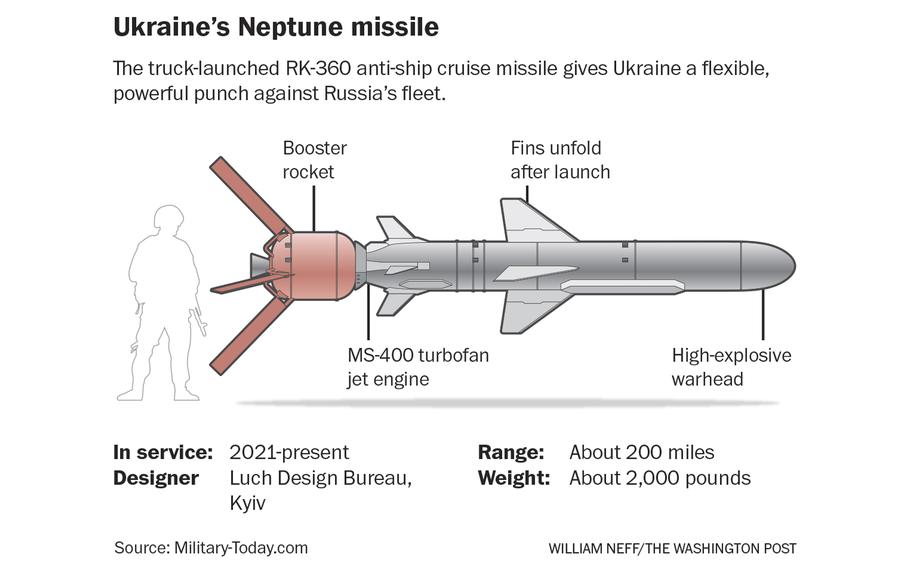
()
Soon after Russia seized Ukraine's Crimea in 2014, a Ukrainian defense firm used an arms show in Kyiv to unveil its latest project: An anti-ship cruise missile it called "Neptune."
The new missile drew little attention at the time. But now it is center-stage after a U.S. defense official said Ukrainian forces used Neptune missiles to strike and sink Russia's flagship Moskva war vessel in the Black Sea.
The strike on Wednesday marked a major boost for Ukraine - not only for its war effort but also for the homegrown arms industry, even as it relies on weapons donated by Western allies.
"For the Ukrainians, if they were able to sink this ship or damage it with their own Neptune missiles, that's a point of pride, first, and a useful military capability in that they will be able to keep the Russian fleet at bay," said Mark Cancian, senior adviser for the international security program at the Center for Strategic and International Studies.
Since Russia invaded on Feb. 24, foreign-made weapons have poured into Ukraine. Among them are anti-armor weapons produced in the United States, small arms manufactured in Europe and even Russian-designed anti-aircraft systems.
But Ukraine is a significant arms exporter itself, with a legacy of building missiles and rockets that goes back deep into the Soviet era.
Russia was once a key export market for those weapons: Between 2016 and 2020, one in five Ukrainian arms exports went to Ukraine's larger neighbor, according to tracking from the Stockholm International Peace Research Institute.
But in recent years, Ukrainian weapons have also been developed to fight against Russian forces.
Ukraine's military said its forces had fired Neptune anti-ship missiles at the Moskva, damaging it and causing it to sink Thursday. A senior U.S. defense official said Friday that two Neptune missiles had struck the ship.
Moscow only said that a fire onboard caused ammunition stocks to detonate, prompting an evacuation of the crew. The ship later sank due to poor weather while being towed to port, Russia said.
On Friday, Russia's Defense Ministry said that it struck the Vizar factory on the edge of the Ukrainian capital. Ukraine's state weapons manufacturer, Ukroboronprom, said in a statement on its website that the Vizar factory was involved in the production of both Neptune missiles and Alder precision-guided rockets.
Some Ukrainians viewed the sinking of the Moskva as a key moment for the domestic arms industry.
"For the first time, a warship was destroyed by an anti-ship missile made entirely in Ukraine," Daria Kaleniuk, executive director of the Anti-Corruption Action Center in Ukraine, wrote on Twitter.
Kaleniuk, a prominent activist on social media, said the reported success of the strike showed Ukraine could handle more technologically advanced weapons supplied by NATO countries.
The Neptune was in development prior to Russia's annexation of Crimea, but its capture helped spur the missile's production. The peninsula houses Ukraine's main navy base and the Soviet-era coastal defense systems that had once protected the country from attack along the Black Sea.
The R-360 Neptune is itself based on an old Soviet cruise missile called the kH-35, which had been produced in the Ukrainian town of Kharkiv. The company that developed Neptune, Luch Design Bureau, was founded in 1965 and had a long history of designing Soviet missiles.
If Neptune missiles were fired at the Moskva, it would mark the first time that the weapon was used in practice, military experts say. The incident also suggests that the cruise missile, which has a stated range of about 200 miles, can evade missile defense systems such as those onboard the Russian ship.
The ship was fitted with long-range radar and an s-300 air-defense system, designed to provide protection not only for itself but the rest of the Russian fleet. Accounts from Ukrainian officials suggest that an aerial drone was used to distract the defense systems during the attack.
Ukrainian officials said last year that four countries had expressed interest in importing Neptune missile systems for their own use, with Indonesia among those who may receive the first shipment.
But there are also worries that Ukraine doesn't have enough weapons at home.
In an interview last year, Luch Design Bureau director Oleg Korostelov said that "due to lack of funding," his company would only be able to supply up to 800 of the roughly 2,000 missiles requested by the Ukrainian military.
"Unfortunately, our level of security is low," he said when asked if Ukraine was prepared to defend itself against a full-scale invasion.